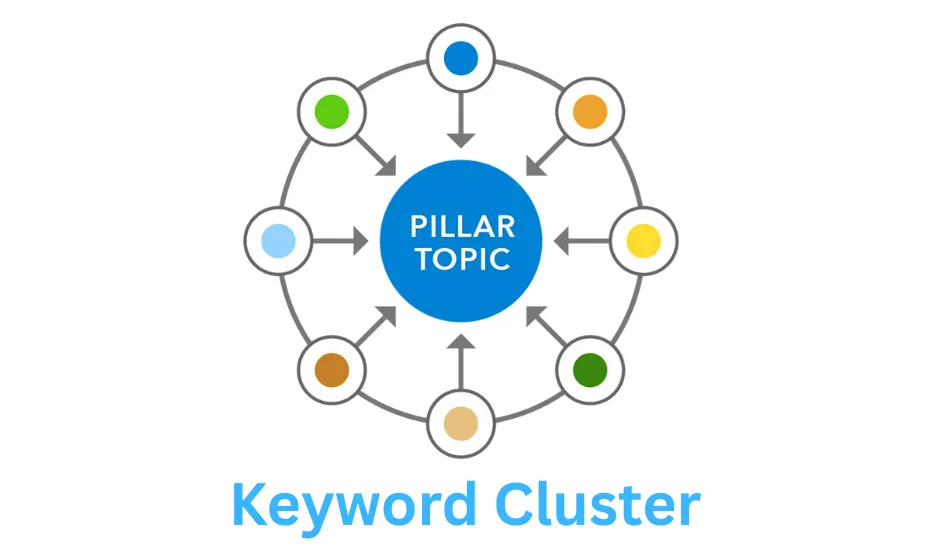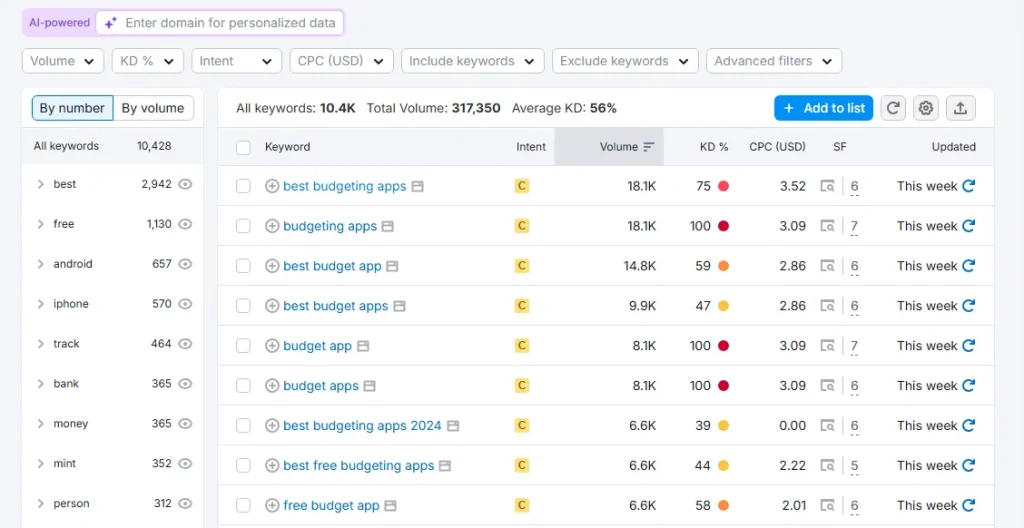
Staying ahead of the competition is paramount in the ever-changing world of search engine optimization (SEO). Webmasters continuously search for creative methods to drive organic traffic and boost website rankings.
One technique that is gaining significant traction is known as keyword clustering. This practice entails grouping connected keywords into clusters, enhancing user experience and improving search engine visibility.
In this guide, I will explain what is keyword cluster in detail and how it can impact your SEO strategies.
Let’s start!
What is Keyword Clustering?
Keyword clustering is a technique used in search engine optimization (SEO) and digital marketing to group similar keywords based on their semantic relevance and search intent.
Marketers can better understand the content themes and topics relevant to their target audience by identifying and organizing related keywords into clusters.
This approach helps optimize website content, create more comprehensive, user-friendly pages, and improve overall search engine rankings. Keyword clustering aids in enhancing keyword research, content creation, and website structure, ultimately leading to increased organic traffic and better user experience.

Benefits of Keyword Clustering for SEO
After understanding what are keyword clusters, let’s check out some key benefits for SEO.
Keyword clustering is beneficial for SEO and marketing purposes and holds significant commercial value. Its main objective is to allocate relevant keywords to content pieces and types to improve organic rankings.
Here, I detailed the benefits of keyword clustering for SEO:
1 – Improved Relevance
One of the primary benefits of keyword clustering is improved keyword targeting. Instead of optimizing individual pages for specific keywords, clustering allows website owners to identify a core topic or theme and create a comprehensive page covering multiple related keywords.
This approach helps to consolidate the ranking potential of different keywords into a single page, making it more likely to rank higher in search engine results pages (SERPs) for a broader range of queries.
2 – Content Optimization
Keyword clusters also facilitates effective content optimization. Website owners can identify content gaps and ensure their pages cover all aspects of a particular topic by organizing keywords into clusters. It allows for better keyword integration in the main content and supporting elements such as headings, subheadings, and meta tags.
This comprehensive approach to content optimization helps search engines understand the page’s relevance to various related queries and improves its chances of ranking higher.
3 – Improved User Experience
Keyword clustering can enhance the user experience by providing more coherent and relevant content. When users search for a specific topic, they often have broader intentions or questions related to that topic.
Website owners can address these broader user intents and provide valuable information that matches the user’s requirements by clustering keywords and creating comprehensive pages. This leads to improved user experience, higher engagement metrics, and potentially more conversions or sales.
4 – Generate More Backlinks
Keyword clustering is the potential to generate more backlinks. When a website has comprehensive content that covers multiple aspects of a topic, it becomes more link-worthy.
Other websites or publishers looking for authoritative resources are more likely to link to a comprehensive page that covers all the relevant information they need. This improves the website’s backlink profile, an important ranking factor for search engines.
How to Do Keyword Clustering
SEO practitioners can use multiple tools and methods to facilitate keyword clustering. Below are several popular methods:
1. Start a Comprehensive Keyword Research
First, you need to search and build a keyword list to do keyword clustering. To do this, you need to find as many related keywords as needed. There are various keyword research tools, such as Semrush, Ahref, Keyword Planner, and others, that help you find keywords and collect data like KD, search volume, and keyword ideas.
Start with the Seed Keyword and then find the secondary keywords to make a list of groups of keywords.
For example, I have searched for “Budgeting Apps” through the Semrush Keyword Magic Tool

The results page shows all related queries and keywords with search volume and keyword difficulty.

Now, collect the data and export keywords to make a list. You can use Google Sheets to list all keywords in one place.
2. Cluster your keywords into Groups
Once you have created your keyword list, now go ahead with the process of clustering keywords. There are two major ways to cluster keywords into groups.
- Search Similarity
- Search Intent
Group your keywords according to search intent, and there are four types.
- Informational
- Navigational
- Commercial
- Transactional
🎯 Pro Tip: When clustering keywords for SEO, focus on search intent, not just matching words. If two keywords lead to similar results on Google (same SERPs), they likely belong in the same cluster.
However, NLP techniques can be used to analyze the semantic similarity along with keywords. Word fixing models like GloVe or Word2Vec can convert words into compact numerical vectors that capture their meaning. Similarity metrics, like cosine similarity, can measure the degree of relationship between keywords.
You can utilize topic modeling techniques like Non-negative Matrix Factorization (NMF) or Latent Dirichlet Allocation (LDA) to identify groups of keywords that share common topics.
These algorithms examine patterns in how keywords appear together and generate clusters based on those topics. Topic modeling is especially valuable when working with extensive collections of keywords.
3. Optimize and Create Content
After finalizing keyword grouping and content planning, now it’s time to create quality content to rank in SERP. According to keyword cluster practice to create well optimized content that cater to your target audience.
Here are some tips to make your content optimized and useful:
- Add keywords to the title, URL(Slug), first paragraph, H1, H2, and H3.
- Write your first heading that is catchy and contains a keyword.
- Spread Seed keywords and secondary keywords throughout the content body.
- Try to practice secondary keywords in subheadings
- Add most relevant internal links and external links to optimize content
- Add schema markup, listing and FAQ’s
4. Monitor Your Keyword Performance
Lastly, it is an important step to monitor and track your keyword clustering and content performance to know whether the strategy works or not. If a strategy does not work, be flexible to take action and changes where needed.
You can monitor and track keyword performance with Google Search Console, Google Analytics and other third-party tools. It can be done manually through searching keyword on search engine.
Keyword Clustering Tools
Several keyword clustering tools are open that automate the method of grouping keywords. These tools leverage data analysis techniques and algorithms to cluster keywords effectively. Some tools offer additional functionalities like competitive research and keyword volume analysis, which can further improve keyword clustering actions.
Here are some of the best keyword clustering tools:
- SEMrush: It offers keyword research tools to find related keywords and organize them into clusters.
- Ahrefs: Ahrefs provides a keyword explorer tool that helps identify keyword variations and their search volume, making it easier to cluster them.
- Moz Keyword Explorer: This tool allows you to analyze keywords and see how they relate to each other, aiding in clustering.
- Keyword Cupid: Specifically designed for keyword clustering, it uses machine learning to group keywords based on similarity.
- ClusterAI: Another tool that automates the keyword clustering process, helping you group keywords for content planning.
- Google Sheets or Excel: You can manually cluster keywords using spreadsheets by sorting and filtering based on relevance.
- KeywordTool.io: Generates a list of related keywords that can be used for clustering.
You may also find free keyword clustering tool on the web to create clusters for free.
Final Thoughts
Keyword clustering meaning combining all your relevant topics or keywords in a main pillar article. It is a valuable SEO technique that greatly impacts website visibility and search rankings. Website owners can improve keyword targeting, optimize content more effectively, enhance the user experience, and increase the likelihood of earning backlinks by organizing related keywords into clusters and creating comprehensive content.
As search engines evolve, it is crucial to adopt strategies like keyword clustering to stay ahead in the competitive online landscape and achieve long-term SEO success.
People Also Ask
What is meant by keyword clustering
Keyword clustering is the process of grouping similar or semantically related keywords together to target multiple search terms with a single piece of content or content hub.
What is keyword clustering in SEO?
In SEO, clustering is organizing semantically related keywords into groups (or “clusters”) based on similar search intent or topical relevance. It helps search engines—and users—understand that your site comprehensively covers a subject, boosting your chances of ranking for multiple relevant keywords.
How do I start keyword clustering?
To start, you should:
- Collect a large list of keywords using tools like Ahrefs, Semrush, or Google Keyword Planner
- Identify relationships based on search intent, topic, or shared SERP results
- Use tools or manual methods to group them into content themes
How large should a keyword cluster be?
There’s no strict rule, but generally:
- Balance breadth of coverage with precision
- 3–10 closely related keywords per cluster is a good starting point
Can keyword clustering help with voice search or AI tools?
Yes! Clustering around long-tail keywords and natural language patterns boosts chances of ranking for conversational queries, FAQs, and snippets used by AI search assistants.




